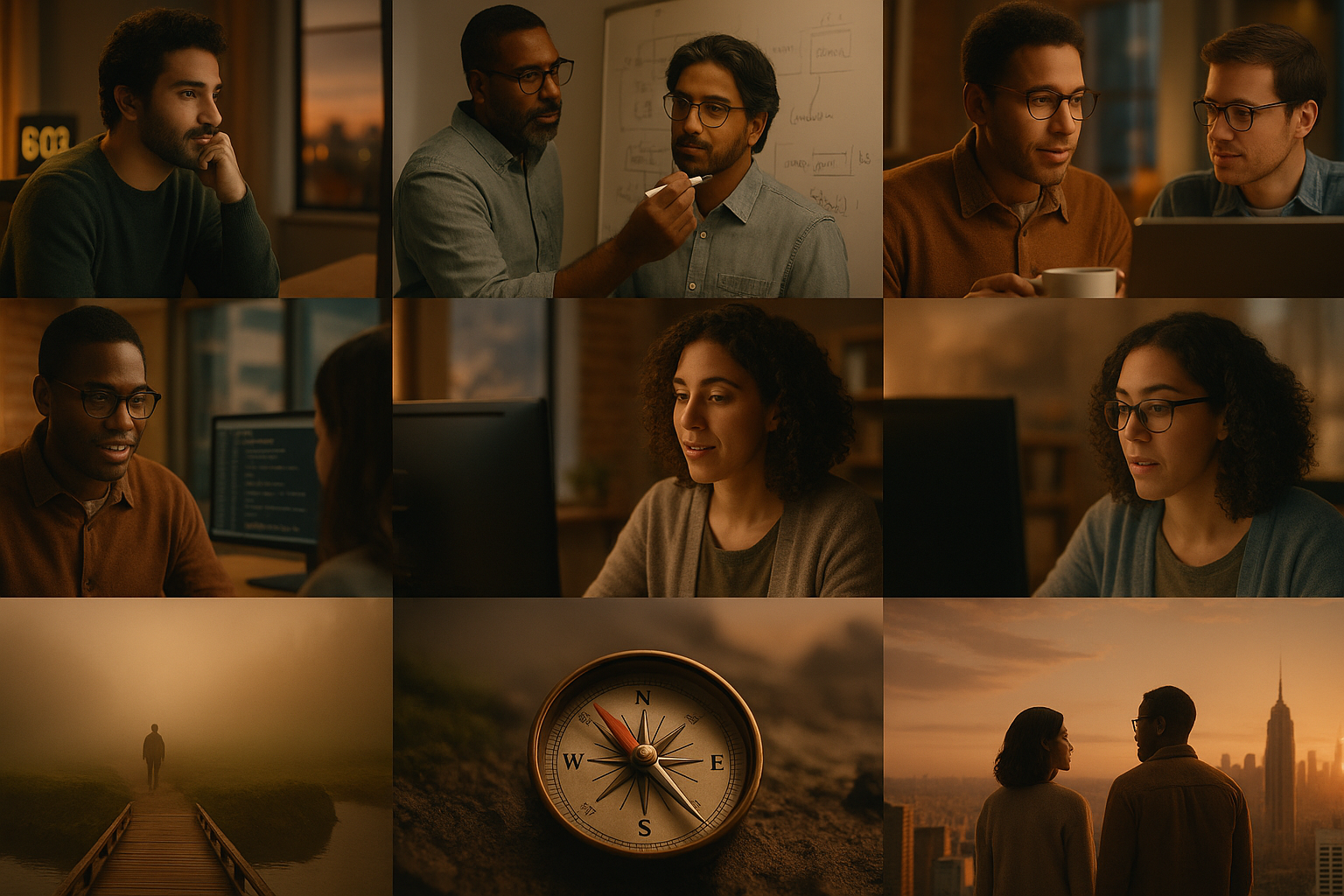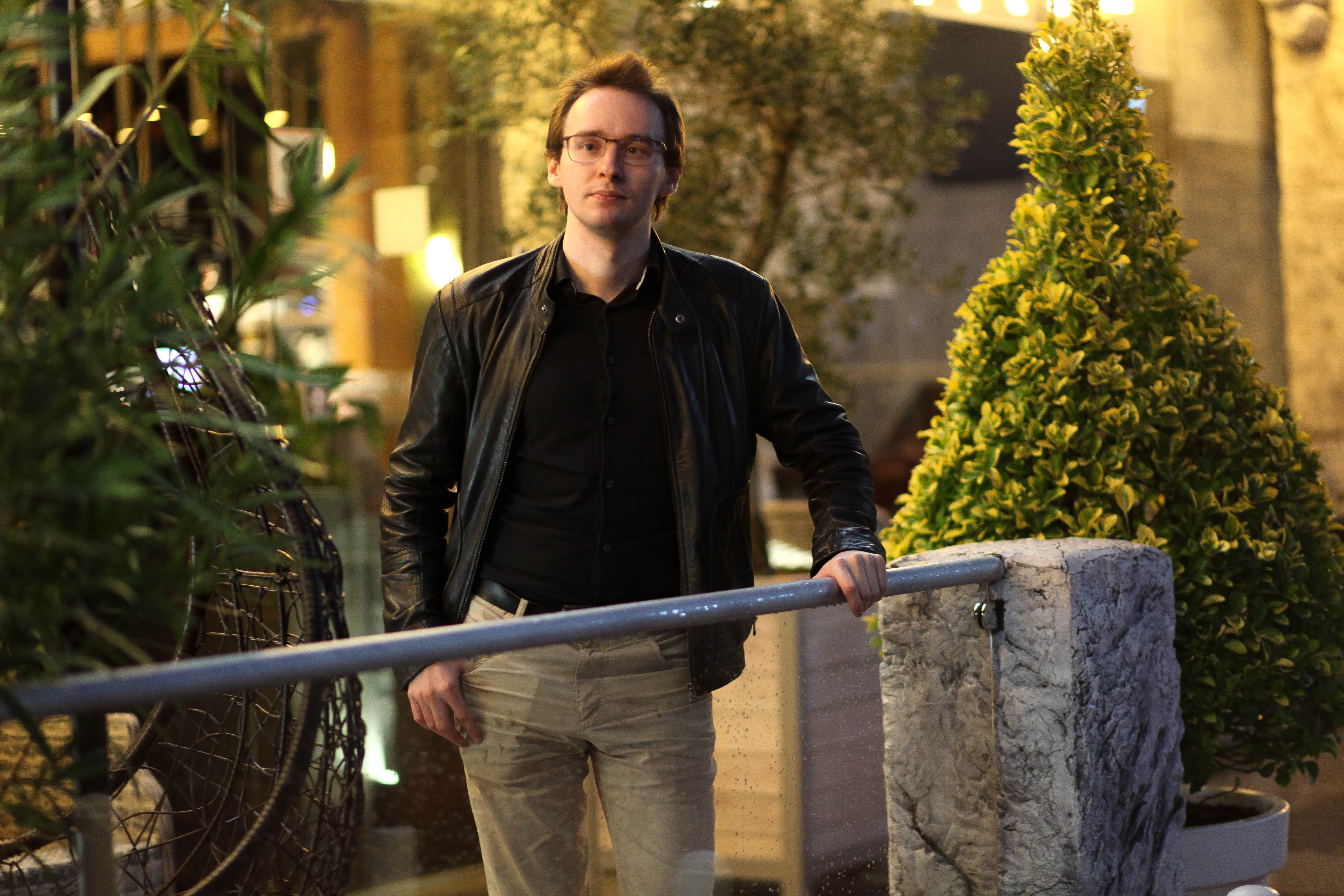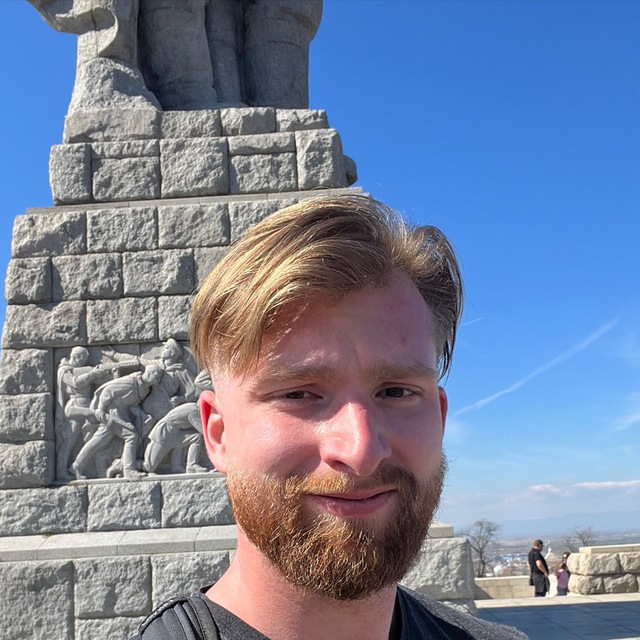The Night I Almost Quit Tech Forever
And how one conversation at 2 AM changed everything about my career trajectory

It was 2 AM on a Thursday. My fourth Red Bull sat empty next to three others, forming a aluminum graveyard on my desk. The deployment had failed. Again. Not because of bad code – I'd checked that seventeen times. Not because of infrastructure issues – AWS was running fine. It failed because I'd missed something fundamental about how our systems talked to each other, something so basic that when the senior architect pointed it out the next morning, I wanted to disappear into my hoodie.
"Six years," I remember thinking. "Six years in this industry, and I still feel like I'm pretending to know what I'm doing."
That night, sitting in the ghostly glow of my monitors in an empty office, I opened LinkedIn and started browsing jobs outside of tech. Marketing positions. Sales roles. Anything that didn't involve pretending I understood distributed systems while everyone around me seemed to navigate them like they were born with kubectl commands in their DNA.
I didn't know it then, but I was experiencing something that 73% of IT professionals face in their first decade – the crushing weight of navigating a career without a compass, in an industry that changes faster than you can learn it.
The Email That Saved My Career
The next morning, bleary-eyed and defeated, I found an email from Sarah Chen. You probably don't know Sarah – she's not Twitter-famous, doesn't have a YouTube channel, hasn't written any books. She's just a principal engineer who noticed a junior developer struggling three desks over.
"Saw you here late last night. Want to grab coffee?"
That's it. Nine words. But those nine words started a conversation that fundamentally rewired how I thought about my career, my growth, and my place in this overwhelming industry.
Over burnt coffee in the company cafeteria, Sarah asked me a question that stopped me cold: "What are you optimizing for?"
I mumbled something about becoming a better developer, shipping quality code, the usual platitudes we tell ourselves. She shook her head.
"No, what are you actually optimizing for? Your life. Not your code."
The Mirrors We Can't See
Sarah became my mentor not through any formal program – our company didn't have one. She simply decided that watching talented people burn out was a waste, and she had the experience to prevent it.
The first thing she taught me was brutal: "You're not behind. You're just looking in the wrong direction."
See, I'd spent years comparing my chapter 3 to everyone else's chapter 20. That senior developer who seemed to know everything? He'd been coding since he was twelve. The DevOps engineer who could debug Kubernetes in her sleep? She'd spent three years at Amazon learning from the people who built the tools we use.
But here's what Sarah showed me that changed everything: They all had mentors. Every. Single. One.
"The tech industry has this mythology of the self-taught genius," Sarah told me. "But even Linus Torvalds had Andrew Tanenbaum. Even Mark Zuckerberg had Steve Jobs. The myth of doing it alone is just that – a myth that keeps talented people stuck."
The Sunday Evening Test
Sarah introduced me to what she called the Sunday Evening Test. Every Sunday at 8 PM, she'd ask herself one question: "Am I excited or am I dreading tomorrow?"
For two years straight, my answer had been dread. Not because I hated coding – I loved it. But because I was lost in a forest of infinite learning paths, unclear expectations, and the constant feeling that everyone else had figured out something I hadn't.
"That feeling," Sarah said, "isn't about your capability. It's about your navigation. You're trying to explore a massive territory without a map, without a guide, without even knowing what destination you're trying to reach."
She was right. I'd been collecting Udemy courses like they were Pokemon cards. I had seventeen tabs open with "must-read" blog posts. My GitHub had twelve half-finished projects, each one abandoned when I read about some new technology I "should" be learning instead.
The Architecture of Confusion
One Thursday, about a month into our informal mentorship, I showed Sarah my "learning plan." It was a color-coded spreadsheet with 47 technologies I wanted to master in the next year. She actually laughed out loud.
"Let me tell you a secret," she said, pulling up her terminal. "I've been doing this for fifteen years, and I know maybe eight technologies really well. Maybe."
She showed me her GitHub. Her commit history wasn't a rainbow of languages. It was depth, not breadth. Projects that went deep into problems, not wide across technologies.
"The industry doesn't need people who know everything poorly," she explained. "It needs people who can solve real problems deeply. But how would you know that? The internet is screaming at you to learn everything, and you don't have anyone to tell you what actually matters for the career you want."
Ready to Find Your Sarah?
Every successful developer has someone who showed them the way. Don't wait for luck – create your opportunity.
The Meeting Where Everything Clicked
Three months into our mentorship, I was in a architecture review meeting. The same kind of meeting where I usually sat silent, frantically Googling terms on my phone under the table.
But this time was different. The team was debating service communication patterns, and I heard myself saying, "What if we're optimizing for the wrong thing here? What problem are we actually solving for the user?"
The room went quiet. The senior architect – the same one who'd made me want to disappear months earlier – nodded slowly. "That's... actually a really good point."
After the meeting, my manager pulled me aside. "I don't know what's changed, but keep it up. You're thinking like a senior engineer."
What had changed? Sarah had taught me to ask the questions nobody was asking. Not "How do we implement this?" but "Why are we implementing this?" Not "What technology should we use?" but "What outcome are we trying to create?"
The Vulnerability of Growth
Here's something they don't tell you about mentorship: it requires admitting you don't know things. In an industry that often rewards confidence over competence, that's terrifying.
I remember the day I finally admitted to Sarah that I didn't really understand Docker, despite having it on my resume for two years. I expected judgment. Instead, she pulled up a chair and spent three hours building containers with me from scratch, explaining not just the how but the why.
"Everyone's faking something," she told me. "The difference between people who grow and people who stagnate is whether they're willing to stop faking it long enough to actually learn it."
That conversation freed me from the prison of pretending. With Sarah, I could say "I don't understand" without shame. Do you know how revolutionary that is in an industry where Stack Overflow karma feels like a measure of your worth?
The Promotion Nobody Saw Coming
Eight months after that first coffee with Sarah, I was promoted to Senior Developer. The same role I'd thought was five years away. The same title that had felt as unreachable as Mars when I was browsing those marketing jobs at 2 AM.
But here's the thing – the promotion wasn't the victory. The victory was that Sunday evenings had changed. I wasn't dreading Monday anymore. I was curious about it. Excited, even.
The code hadn't gotten easier. The technologies hadn't slowed down. But I had something I didn't have before: perspective. Direction. Someone who'd walked this path and could tell me which dragons were worth fighting and which were just shadows on the wall.
The Pattern I Started Seeing Everywhere
After my breakthrough, I started noticing something. Every successful developer I met had a Sarah story. Maybe their Sarah was named Marcus or Priya or Chen. Maybe it was formal mentorship or informal guidance. But they all had someone who'd shown them the path.
The contractor who became a staff engineer at Google? She had a mentor who taught her to write docs that got noticed by the right people.
The bootcamp grad who became a team lead in eighteen months? He had a mentor who showed him that leadership wasn't about knowing the most – it was about empowering others to know more.
The developer who successfully transitioned from frontend to machine learning? They had a mentor who helped them build a learning path that actually made sense, instead of randomly following YouTube tutorials.
The Cost of Going It Alone
I calculated it once. Those two years of spinning my wheels, of learning the wrong things, of building half-finished projects that impressed nobody – they cost me about $140,000 in potential earnings. Not to mention the therapy bills from the imposter syndrome and the physical toll of those 2 AM debugging sessions.
But the real cost wasn't financial. It was the nearly quitting. It was the Sunday evening dread. It was the relationships I neglected because I was always catching up, always behind, always one tutorial away from feeling competent.
Sarah saved me from all of that with nine words and a coffee invitation. But not everyone gets a Sarah who notices them struggling. Not everyone works three desks away from someone willing to help.
The Question That Changes Everything
Two years after that first coffee, Sarah was leaving the company for a principal architect role at Microsoft. At her goodbye party, I asked her why she'd helped me. She didn't have to. She got nothing from it.
"Someone helped me once," she said. "When I was drowning in my third year, convinced I wasn't cut out for tech. His name was David. He spent a year showing me what I couldn't see on my own. The only payment he asked for was that I do the same for someone else someday."
She smiled. "Besides, watching someone finally understand their own potential? That's the best debugging high there is."
The truth nobody talks about:
In tech, we worship the myth of the self-made developer. But behind every great developer is someone who showed them the way. The only question is: will you find your guide by luck, or by intention?
Your 2 AM Moment
Maybe you haven't had your 2 AM moment yet. The moment where you question everything, where the gap between where you are and where you want to be feels insurmountable.
Or maybe you're living it right now. Maybe you're reading this during your lunch break, wondering if everyone else finds this as hard as you do. (They do.)
Maybe your Sunday evenings are heavy with dread, your GitHub is a graveyard of good intentions, and your career feels like a hamster wheel where you're running hard but going nowhere.
Here's what I learned from Sarah, and what I wish I could tell every struggling developer: You're not broken. You're not behind. You're not an imposter.
You're just trying to navigate one of the most complex, rapidly-changing industries in human history without a guide. That's not weakness – that's insanity.
The Email You Need to Send
After Sarah left, I became the Sarah for others. Not because I'm special or particularly talented. But because I remember the darkness of not knowing what you don't know. I remember the weight of feeling like everyone else got a manual you didn't receive.
And every time I mentor someone, I see the same pattern: Brilliant people held back not by capability, but by navigation. Talented developers drowning not because they can't swim, but because nobody taught them which direction the shore is.
So here's my challenge to you: Don't wait for your Sarah to find you. Don't hope that someone notices you struggling three desks over. Don't bet your career on serendipity.
Send the email. Book the coffee. Ask for help. Because the distance between struggling alone and thriving with guidance is exactly one conversation.
You don't need to have all the answers. You just need someone who's already asked the questions.
Your story doesn't have to be a struggle.
Every senior developer, every tech lead, every CTO was once where you are now. The only difference? They found their guide. Whether through luck, through programs, or through persistence – they found someone who'd been there before.
Your breakthrough is waiting on the other side of asking for help. The question is: how much longer will you try to find it alone?
Your Sarah Is Waiting
These aren't just mentors. They're developers who remember what it's like to struggle, and they're here to light your path.

Mikhail Dorokhovich
Founder
Full-Stack Development, System Architecture, AI Integration
Founder of mentors.coach. Full-stack engineer with 9+ years of experience building scalable platforms, mentoring teams, and shaping modern engineering culture. Passionate about mentorship, craftsmanship, and helping developers grow through real projects.
Specialties:

Gaberial Sofie
Co-Founder & HR Partner
Talent Development, Team Culture, HR Strategy
Co-founder and people-focused HR professional with a background in organizational psychology. Dedicated to building compassionate, high-performing teams where mentorship and growth come first.
Specialties:

George Igolkin
Blockchain Developer
Smart Contracts, DeFi, Web3 Infrastructure
Blockchain engineer passionate about decentralized systems and secure financial protocols. Works on bridging traditional backend systems with modern blockchain architectures.
Specialties:

Valeriia Rotkina
HR & Career Coach
Human Resources, Learning Programs, Career Education
HR specialist and educator with a focus on personal development and emotional intelligence. Helps professionals find clarity in their career path through structured reflection and goal-setting.
Specialties:

Kristina Akimova
HR Strategist
Recruitment, Employer Branding, Team Well-Being
HR partner dedicated to fostering healthy team dynamics and building inclusive hiring processes. Experienced in talent acquisition and communication strategy for growing tech companies.
Specialties:
Stop Struggling Alone
The hardest part of finding a mentor isn't the search – it's admitting you need one. You've already done that by reading this far.
Because your next breakthrough is just one conversation away.